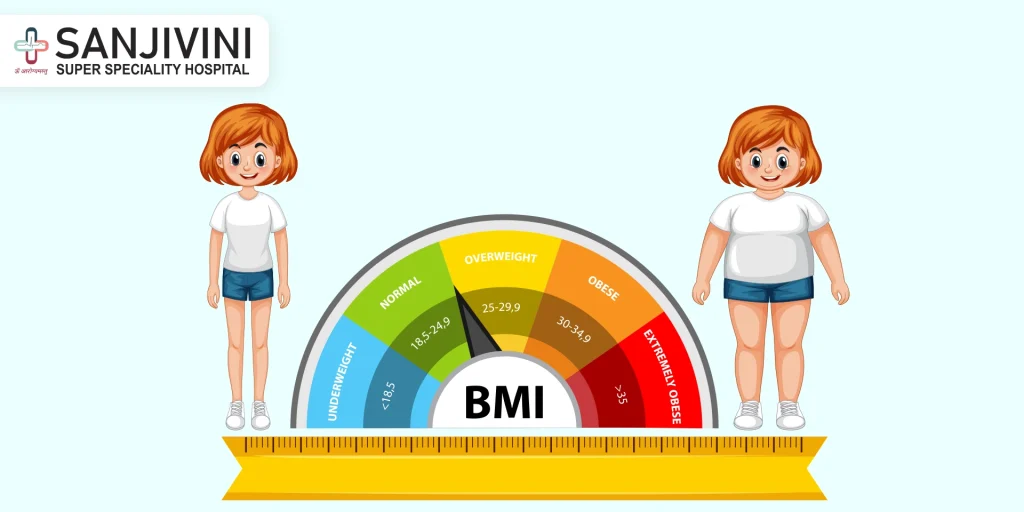
Medically Reviewed by – Dr Jitendra Singh M.B.B.S, M.D (Pediatrician & Neontalogist)
Childhood obesity has become one of the most common health concerns among children today. As, it affects physical health, emotional well-being of child, and also increases the risk of chronic diseases later in life. But the good news is that with early awareness and healthy habits, parents can easily help their children maintain a healthy weight and grow strong.
So, this guide will help you understand what childhood obesity is, all its causes, signs, and how parents can prevent it through lifestyle changes and timely medical support.
What Is Childhood Obesity?
Childhood obesity occurs when a child carries excess body fat for their respective height and age. It is usually measured using the Body Mass Index (BMI) percentile chart that compares a child’s weight and height with others of the same age and gender. A child is considered overweight if their BMI is between the 85th and 95th percentile, and obese if it is at or above the 95th percentile for age and sex (CDC guidelines).
Globally, the number of children affected by obesity has risen dramatically over the past few decades. As per the World Health Organization (WHO), obesity has become one of the fastest-growing global health challenges.
Childhood obesity in India is becoming a growing concern as UNICEF India’s Child Nutrition Global Report 2025 notes that India’s childhood obesity rates have more than doubled over the past decade.
Causes for Childhood Obesity

- Unhealthy Diets: High intake of sugary drinks, fast foods, fried snacks, and processed foods which may lead to excess calorie consumption.
- Lack of Physical Activity: Increased screen time of your child and reduced outdoor play may lower the energy expenditure.
- Genetic Factors: Children with either one or both overweight parents are more likely to gain excess weight.
- Emotional Factors: Stress, anxiety, and even lack of sleep may contribute to unhealthy eating habits.
- Medical Conditions: Hormonal disorders like hypothyroidism or certain medications can cause weight gain too.
In many cases, a combination of lifestyle and environmental factors plays a bigger role than genetics alone.
Why Early Action Matters
Early detection and management of childhood obesity are very crucial nowadays. Overweight children are more likely to remain obese into adulthood, thus it may increase the risk of chronic conditions such as:
- Type 2 diabetes
- High blood pressure
- Joint pain
- Sleep apnea
- Heart disease
In addition to all these physical problems, obese children also get low self-esteem and social anxiety, which may affect their mental health and academic performance too.
The key to childhood obesity prevention is early intervention, i.e., parents and doctors should work together to identify risk factors and guide the child toward healthy habits for kids before serious complications develop.
Recognizing the Signs of Obesity
Parents can often spot early symptoms of obesity in childhood through daily observations. Some indicators include these:
- Rapid weight gain not matching height growth
- Fatigue or lack of energy during play
- Breathlessness or snoring during sleep
- Clothing becoming tighter too quickly
- Preference for sedentary activities like TV or mobile use
- Emotional eating or frequent snacking out of boredom
If you notice any or all of these signs, it’s best to schedule a pediatric checkup for assessment and advice. A doctor will measure BMI, review the diet of child and activity level, and then recommend additional tests if needed.
How Parents Can Help
Parents play the most important role in preventing childhood obesity. Here are some practical steps that every family can take to encourage healthy growth of their child:
1. Build a Balanced Diet
- Include more fruits, vegetables, whole grains, and lean proteins in your child’s meals.
- Limit all the sugary snacks, fried food, and packaged juices.
- Avoid forcing children to “finish everything on the plate” please let them eat until full.
- Consult a pediatrician for pediatric nutrition guidance according to your child’s needs.
2. Encourage Physical Activity
- At least 60 minutes of physical activity daily, it could be anything like sports, cycling, dance, or even any outdoor play.
- Reduce screen time to less than 2 hours a day.
- Make family time more active through evening walks or weekend games.
3. Establish Healthy Routines
- Ensure atleast 8 to 10 hours of quality sleep each night.
- Maintain regular meal times to prevent any overeating.
- Keep water easily available and avoid soft drinks.
4. Be a Role Model
Children often mirror all the parental habits. Eating balanced meals and staying active as a family will help create a healthy environment that will support long-term habits.
The Role of Pediatricians and Nutrition Experts
Medical professionals play a key role in addressing obesity treatment in children. At Sanjivini Super Speciality Hospital, pediatricians and nutritionists work together to design personalized care plans that suit each child’s needs. These may include:
- Growth tracking and BMI evaluation
- Nutritional counseling and diet planning
- Screening for underlying hormonal or metabolic issues
- Regular follow-up visits to track progress
You can explore all these services on our website and book an appointment with our Pediatrics & Neonatology department for complete child care.
Why Choose Sanjivini Super Speciality Hospital

Sanjivini Super Speciality Hospital provides holistic care that focuses not only on treatment but also on prevention and education. Our pediatric team ensures that every child gets:
- Expert consultation for nutrition, growth, and development
- Guidance for preventive health programs and regular checkups
- A compassionate and child-friendly environment for young patients
Visit our Geriatric & Palliative Care page to understand how we care for every generation of your family — from children to elders.
Take the First Step Toward a Healthier Future
If you suspect your child is gaining excess weight or not eating well then don’t wait. Early guidance can prevent all long-term health problems. Below we have mentioned the steps to start today:
- Schedule a pediatric consultation for a full children’s health checkup.
- Replace sugary snacks with fresh fruits and healthy home-cooked meals.
- Make fitness fun — play, dance, and enjoy active time together.
- Create a routine that includes balanced meals and proper 8 to 10 hours sleep.
Always remember that small changes can make a huge difference. Childhood obesity is preventable but with the right care.
Frequently Asked Questions
How can I tell if my child is obese?
Your pediatrician will calculate your child’s BMI percentile to determine if their weight is within a healthy range.
Can a child lose weight safely?
Of course. With doctor-supervised nutrition and regular physical activities, children can gradually achieve a healthy weight without doing any restrictive dieting.
What is the best diet for preventing childhood obesity?
Balanced meals rich in fruits, vegetables, whole grains, lean meats, and low-fat dairy should be included in the diet. Also, try to avoid processed and sugary foods.
When should I visit a doctor?
If you notice rapid weight gain of your child, fatigue, or signs of emotional eating, then immediately schedule a pediatric and nutrition consultation.
A Healthy Future Starts Today
Childhood obesity is more than a weight issue — it’s a lifestyle and awareness challenge too. By understanding the actual causes of childhood obesity, taking early action, and working closely with healthcare professionals, parents can help their children lead healthier and happier lives.
Sanjivini Super Speciality Hospital is committed to supporting families through every stage of growth with expert pediatric care, nutritional counseling, and preventive health checkups.
